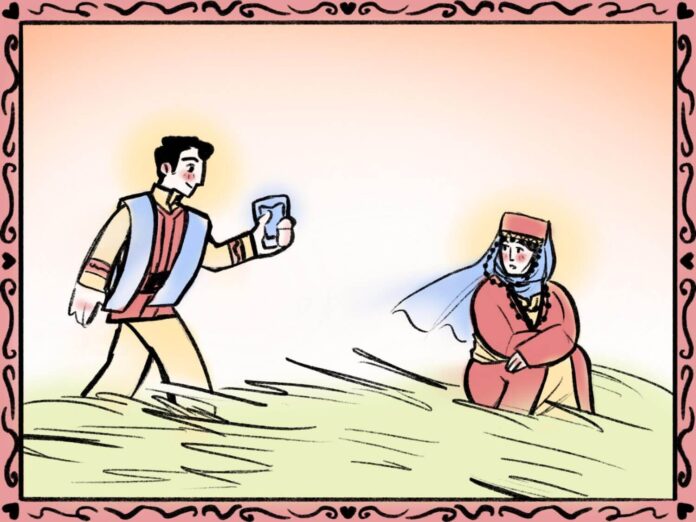Usually, I drink a glass of water every night before I go to sleep — I’ve done this for as long as I can remember. However, on the eve of Feb. 14, I did not, and neither did thousands of young, unmarried Armenian men and women.
St. Sargis, or Surp Sargis, was a Cappadocian Greek general of the Roman army and is the patron saint of youth and love in the Armenian community. The holiday dedicated to him, St. Sargis Day, is a movable holiday that fell on Feb. 15 this year. On the eve of the holiday, young, unmarried men and women eat a salty pastry called aghablit to make us thirsty before bed, with the hope of seeing our future spouse bring a cup of water in our dreams.
When I first learned about this tradition, I found it very romantic and sweet, but I was also a bit skeptical as to whether it even works. I began asking a few of my older family members about it, and to my great surprise, there have been a few successes.
The first success story is my mother’s from when she was 22. In her dream, she was in the front yard of her parent’s house — the same house of my grandparent’s where I spent most of my childhood — and the hose was broken. An unknown man, my father, fixed the hose for her. When my mother experienced this dream, she had not met my father yet. In her dream, her family told her that he was her cousin’s friend, and that was confirmed in real life when she met him.
The second story is my aunt’s, my mother’s sister. When she was 19 and talking to her current husband, my uncle, she tried the experiment. She remembers being in a green field where there was a well. My uncle filled a cup with the well water for her. She ate another aghablit a year later and once again saw her husband.
A distant relative saw her future mother-in-law. She had yet to meet her husband and his mother.
This year, my friends and I decided to partake in this tradition. It was my first time trying it out, and I couldn’t tell if I was nervous, excited or confused.
On a surface level, it feels incredibly exciting to know who your future spouse will be. This is a question that often dwells in the minds of young people. The question of who they will marry is such a big mystery to some, and the chance of that question being answered within a mere night can be peaceful. It is almost as if it is one less uncertainty in life — one more thing that we have had the chance to figure out about ourselves.
However, there is also the possibility of the dream being wrong. I have been looking at this cultural practice as a scientific experiment, and an important aspect of an experiment is not having multiple variables that might have a consequence on the validity of the results. What if on the eve of Surp Sargis and before eating the aghablit, one has an interaction with a friend or a classmate and that has an effect on their dream? What if someone is on one’s mind and they see them? How will I know if my dream is flawed or correct? More importantly, is the future spouse a soulmate?
It is also possible to not even have a dream, which happened to my father, his sister, a great uncle and my grandma when they ate aghablit.
There have also been failures, some very funny, within my family.
For example, my grandpa had a dream where a woman did bring him water, but he refused to take it. One of my mother’s cousins, when she was around 14, saw her celebrity crush of the time, Iranian actor Farhad Jam. Her older sister saw Jon Bon Jovi, but instead of giving her a cup of water, he gave her a cassette tape saying “This is our new album.” The album of that year was “Crush.”
Feb. 15 arrived, and my friends flooded my messages asking me whom I had seen and telling me accounts of their dreams.
These were the results of our experiment:
Friend No. 1 saw her crush in her dream. He gave her two glasses of water.
Friend No. 2 saw the same faceless man she had seen when she was 16.
Friend No. 3 saw multiple people.
Friend No. 4 saw only a hand giving her water.
Three other friends didn’t see anyone.
Similarly, the results of my test happened to be null. I saw no one, and I am convinced it was because of my alarm that woke me up. However, this got me thinking — did I even want to know who my future husband will be?
I’m a bit glad that I didn’t see anyone. Seeing the evidence of success in this love experiment makes me a bit scared. Looking at my own thought process from a different angle, I feel that a huge part of why youth is so romanticized and what makes being young so exciting is the uncertainty of the future. I don’t know what’s going to happen in a week from now, where I will work within the next five years, where I will live when I’m older, what countries I will visit or what new friends I will make — and that makes me excited. There are so many things that I have yet to experience, and I wouldn’t want to get a pre-planned calendar of my entire life handed down to me.
Contact Francine Ghazarian at ghazarian@oxy.edu
![]()































